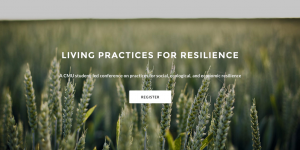Organizers hope conference will build relationships, spark discussion
Students from Canadian Mennonite University are organizing a conference exploring alternative ways people can live well with each other and with the land.
Alternatives: Living Practices for Resilience will be held at CMU (500 Shaftesbury Blvd.) on Friday, April 8 from 9:00 AM to 5:00 PM. All are welcome to attend. Admission is by donation.
Students will lead panel discussions exploring a diverse range of topics related to the theme, including alternatives to industrial food culture, how people can reduce their dependence on fossil fuels, and how affluent Canadians can work toward greater equality for all people.
In the middle of the day, conference attendees will meet together for a potluck lunch.
 Students from four CMU classes are organizing the conference and will discuss research findings across disciplines. The four classes include: Citizenship, Land, and Economy; Economics of Social Change; Just and Sustainable Food Systems; and Voluntary Simplicity.
Students from four CMU classes are organizing the conference and will discuss research findings across disciplines. The four classes include: Citizenship, Land, and Economy; Economics of Social Change; Just and Sustainable Food Systems; and Voluntary Simplicity.
Kenton Lobe, Instructor of International Development Studies, and James Magnus-Johnston, Instructor of Political Studies and Economics, teach the classes.
In addition to the panel discussions, students from the Voluntary Simplicity class will lead a number of workshops, including an introduction to bread-making, as well as a nature walk during which students will explain how some of the voluntary simplicity practices they have adopted link to the land.
“The point of the conference is to look at ways of being that haven’t been given the significance we think they should be given,” says Matthew Dyck, a third-year student at CMU and one of the conference’s organizers. “We’re trying to bring together broad, overarching theories and individual practices so that people can live fuller, more resilient lives.”
Students from the four classes are organizing the conference in lieu of writing a final exam.
Lobe likens the conference to a concert in that it gives students an opportunity to take their practices from the classroom to the wider community.
“A traditional final exam is one way to encourage students to bring together their learning from the semester, and it generally involves the individual student and the professor,” Lobe says. “This student-led conference creates a space to enlarge the audience students are engaging, providing an opportunity for them to perform some of the things they have learned in the classroom.”
Dyck, a Social Science major enrolled in Magnus-Johnston’s Economics of Social Change course, says he and his peers are enjoying organizing the conference.
“It’s exciting that we get to do something that we present to the public, beyond the academic environment of the classroom,” Dyck says.
“My hope is that people who attend the conference connect with each other and bond over common ideals, and that the conference sparks some discussions that continue on once the conference is over.”
For more information about Alternatives: Living Practices for Resilience, and to register, visit www.alternativesconference.weebly.com.
About CMU
A Christian university in the Anabaptist tradition, CMU’s Shaftesbury campus offers undergraduate degrees in arts, business, humanities, music, sciences, and social sciences, as well as graduate degrees in theology, ministry, peacebuilding and collaborative development, and an MBA. CMU has over 800 full-time equivalent students, including those enrolled in degree programs at the Shaftesbury and Menno Simons College campuses and in its Outtatown certificate program.
For information about CMU visit www.cmu.ca.
For additional information, please contact:
Kevin Kilbrei, Director of Communications & Marketing
kkilbrei@cmu.ca; 204.487.3300 Ext. 621
Canadian Mennonite University
500 Shaftesbury Blvd., Winnipeg, MB R3P 2N2
